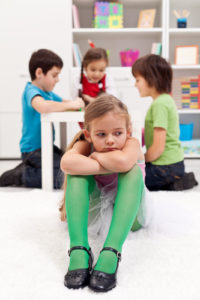
Early Attention to Your Child’s Eyes Can Greatly Improve Their Life
We’ve spoken before about how important it is for school-aged children to get their eyes checked so that they can flourish in the educational system. What we don’t talk a lot about, however, is how paying attention to your child’s eyes early on in life is setting them up for a lifetime of success.
We use our eyes every day to complete various activities, not just reading. Children, possibly more than anyone, are highly visual. They need their eyes to discover the new world around them, play games, and make friends. It’s not just for educational purposes. A child who does not learn social skills is not one that will be set up for a good life.
Social Interaction and Your Child’s Eyes
Studies have shown that elderly adults with low or poor vision are more likely to withdraw from friends and family and isolate themselves. There have been limited studies on how poor vision affects children, but one can only assume the want to withdraw is even more present in children who can’t understand their vision.

When a child is unable to participate in activities such as sports, board games, or arts and crafts because of their poor vision, they are missing out on crucial building blocks. Many believe education is about learning how to read, write and solve a math equation, but there’s so much more to it.
Learning to make friends through common interests and team-building activities is important. It’s something people working in corporate offices even do because they understand the value of a group of people who work well together.
Children are doing the same when they play sports and other group activities. They are learning how to build friendships as well as working relationships. Group school projects teach them how to effectively work on one project together.
However, this development is severely hindered when a child has vision problems that are not being tended to. They’ll feel shy and cast aside because they won’t be able to partake in activities the way they should.
If your child already has irreversible vision impairments, it doesn’t mean they won’t ever have friends, though. Teachers and parents can employ special techniques to help these children flourish socially.
Extracurricular Activities and Your Child’s Eyes
Take soccer for example. If a child can’t see the ball, they won’t play well. If they don’t play well, then we can all guess who won’t be getting picked first in gym class. Vision has a great impact on sports like football, so if your child is an athlete, it’s important to pay attention to their eye health.
It doesn’t matter if the withdrawal is forced on a child by not being included by other children in activities or because the child feels they are not good at anything like the others. The result is the same: a lonely child who struggles to make connections with their peers.
This is why taking your child to the eye doctor once a year until they’re 18 is extremely important. Without early detection of vision conditions, you are not setting your child up for a healthy and sociable life.
Future Vision Conditions
Many uncorrected vision conditions that develop early in a child’s life can lead to a lifetime of vision impairments. Children grow out of a lot of things, but vision disorders are not one of them. Not unless they are helped along by a doctor and treatments.
Amblyopia, otherwise known as lazy eye, is a very common early childhood vision disorder. It is also completely treatable. The catch is that it must be treated by the age of seven. After that, it will probably be too late. The eyes will have settled into the lazy eye and there is no reversing it.
Adults with lazy eye struggle every day. There is no cure for adult amblyopia. It is strictly a condition that has to be cured during childhood, otherwise, there’s no chance of reversing it. There are treatments available to patients with adult lazy eye which include vision therapy and eye exercises. However, neither of these promises a cure.
Myopia, or nearsightedness, is also a condition that can develop in childhood and cement itself in your child’s eyes if not treated immediately.
Some children are born with myopia, in which case they may benefit from a specialized vision therapy program. Some children, however, develop myopia because they participate in too many “near” activities. These types of activities include reading, writing, drawing, watching TV, playing video games, etc.
When children don’t have the opportunity to play outside and work their distance vision, the body adapts to their daily activities. Children’s eyes are much more malleable than those of an adult. So when they do too much close-distance playing, they will lose their ability to see at a distance.
Now, you may not be able to tell from the way your child is behaving, but an eye doctor will notice the difference right away. Again, this is why it is crucial to have your child’s eye checked regularly.
Early detection is the only way to nip these problems in the bud. When you take care of your child’s eyes early, you are setting them up for a healthier and more successful life.
Your Child’s Eye Screenings
Eye screenings, often offered at the beginning of every school year, are not enough. Sure they can be great to detect refractive errors, but that’s the extent of it. To find potentially dangerous and vision-threatening conditions, your child needs to see an eye doctor.
The rule of thumb is to take your child to the eye doctor every year starting at the age of three, until they’re 18. The reason for this is that the eyes don’t stop changing until adulthood.
Yes, certain conditions may solidify during childhood, but on the other hand, healthy eyes may develop conditions late in their teenage years as well. In the meantime, there are lots of things you can do to help improve your child’s vision. For example, some research suggests that going to 3-D movies can be detrimental to a child’s vision. Not everything you do for your child’s eyes has to be expensive, either. You can also try a variety of options that won’t break the bank.
Don’t think that just because your child isn’t reading yet that they don’t need to have their eyes checked. We use our eyes for a multitude of things. Get them checked and get yours checked too!
Our Rebuild Your Vision Ocu-Plus Formula Contains All 17 Vitamins, Minerals, and Herbal Supplements to Improve Your Eye Health!












I can’t agree with you more! Years ago I had my kids do an eye test, cover one eye and read a chart I’d made, then switch to the other eye and repeat the process.
When I got to my 10 year old daughter she covered one eye, read the chart but when she switched to the other eye she said “I don’t use that eye for seeing.” Imagine my horror! I took her to an eye doctor that day, he said she had a ‘lazy eye’ and gave her a patch to cover the seeing eye and she gradually got the non-working eye up to speed. Imagine her growing up and driving with NO depth perception.
I have Rentinitis Pigmentosa What is the latest news on a cure. I’m in my late 50’s. Thank you